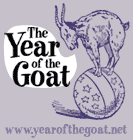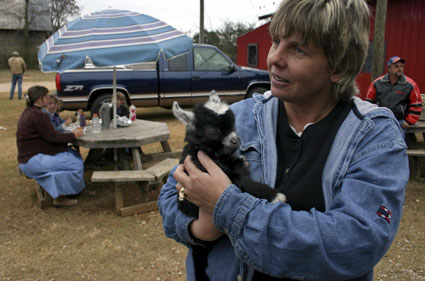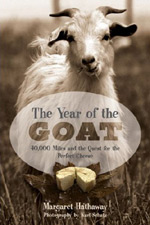While waiting, we chatted with the locals. Jerry Smith, the former owner of the Circle H Auction House who's had goats since he was twelve, said that in the last fifteen years, Alabama's meat goat business has noticeably grown. A man called Jumper, who has been selling goats to buyers in Miami for the past forty years, agreed with him, but said that the largest goat auctions are still the ones that supply the New York area. The New Holland, Pennsylvania auctions, he said, are where the real money is.
Cindy Simmons, who keeps two pet Pygmy goats, Cupcake and Spock, wasn't interested in the business angle. She'd bought Spock at this auction three weeks ago, when he was ten days old, and has been bottle feeding him every two hours since she brought him home. An enthusiast for all types of animals, Cindy wasn't looking for another goat today; between cradling him in her arms, and chasing after Spock as he capered about, she thought that one kid was enough. Cindy, like many people there, seemed to have come to the auction not to bid, but just to visit. We got the feeling that as much as anything else, the Saturday morning auctions were a Brundidge social event.
The auction itself was not unlike the one we'd previously attended. Goats were led individually into a stuffy arena, where, for the most part, three main livestock dealers bid on them. There were a few families there, looking for Christmas pets, but the majority of bidders would be reselling the animals for meat. The animals looked thin and a little gooey around the nose, and it both amazed me that dealers would pay anything for them, and made me sad that they bid so little. Outside, a light drizzle had turned to rain, and after about an hour, we decided to get back on the road. —MMH


